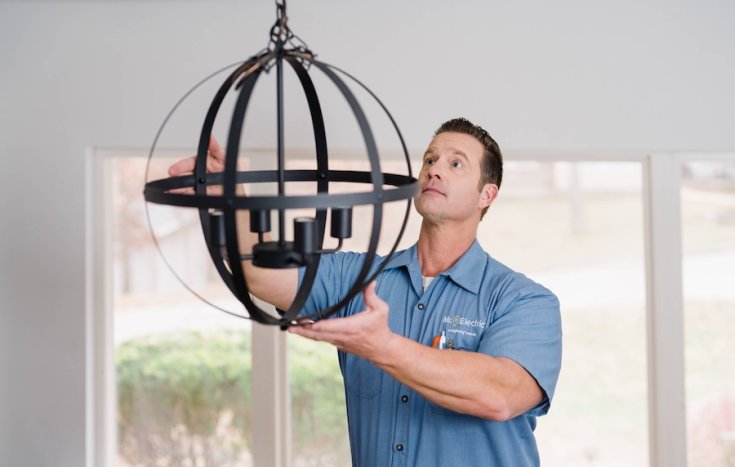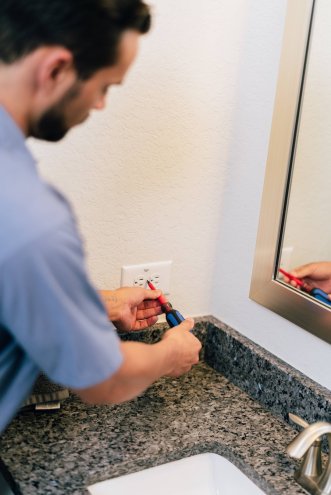You flip a switch or plug in a device and the lights come on, the coffee maker heats up, or your computer powers to life. It all feels effortless. Behind the scenes, however, an entire network of wires is working hard to keep your home or business running smoothly.
While an electrician spends years mastering these systems, most property owners don’t know the first thing about what’s going on inside the walls. As it turns out, understanding the basics of electrical wiring can help you appreciate how your system works, spot warning signs of trouble, and even consider smart upgrades.
In this brief article brought to you by Mr. Electric we get the ball rolling with a primer on basic wiring. If you'd rather speak with a certified electrician, or if you need urgent repair, then call or message Mr. Electric to get in touch.
Meet the Three Key Wires
Think of your electrical wiring as a highway - except electricity travels at near lightspeed, and it needs well-marked lanes and exits to get where it’s going safely. That’s where ground, neutral, and hot wires come in.
- Hot Wire: The hot wire is like the express lane. It carries electricity directly from the breaker panel to the outlets, switches, and fixtures that need it. Without it, nothing would power on. Hot wires are usually black or red, and they are always "live." This means they are loaded with electricity and can deliver a shock if touched, even when a device is switched off.
- Neutral Wires: If hot wires are the lanes heading downtown, then neutral wires are the return trip. Electricity needs to complete a circuit to function properly, and neutral wires provide the path back to the breaker panel. They’re typically white and play just as important a role as hot wires.
- Ground Wires: The ground wire is your safety net - or an off-ramp. It doesn’t normally carry electricity, but it’s there to redirect current into the earth if something goes wrong. Ground wires are usually green. Without them, small issues could quickly turn into electrocutions or electrical fires.
Why Knowing This Matters
Now, you might be thinking: "This is interesting, but I’m not rewiring my house myself." And that’s fair. Most electrical work should only ever be done by a licensed electrician.
But having this basic knowledge helps you understand what’s at stake. If you ever see exposed wires, flickering lights, or discolored outlets, then you’ll know these aren’t minor annoyances - they’re red flags.
Warning Signs in Electrical Wiring
Even if you’re not handling wires directly, you might experience the wrath and destruction. Here are some signs to watch for:
- Burn marks or discoloration around outlets or switches. (This could mean the hot wire is overheating or making poor contact.)
- Frequent breaker trips. (If the neutral wire isn’t returning electricity properly, then the circuit may overload.)
- Shocks when touching appliances. (A missing or faulty ground wire may be letting electricity leak to metal surfaces.)
- Flickering or dimming lights. (Could signal loose wiring connections or overloaded circuits.)
These are not just warning signs; they're bright red flags! Ignoring them can increase the risk of damage or fire. Call or message Mr. Electric if you need emergency electrical repair service. We offer upfront price quotes and a 1-year workmanship guarantee.
Upgrades That Make a Difference
Now that you know the roles of these wires, you can better appreciate opportunities for upgrades. Here are a few worth considering:
- GFCI Outlets: Ground Fault Circuit Interrupter outlets constantly monitor the balance between hot and neutral wires. If they detect even a small imbalance, they shut off.
- AFCI Breakers: Arc Fault Circuit Interrupters detect dangerous arcing in electrical wiring that can lead to fires. Like GFCI outlets, they’re now required in many modern installations.
- Panel Upgrades: If your home or business is older, your breaker panel may not keep up with today’s demands.
Finally, remember to schedule annual electrical inspections so that a certified electrician can confirm that your electrical system is functional and safe. The uniformed local pros at Mr. Electric are always ready to help.







